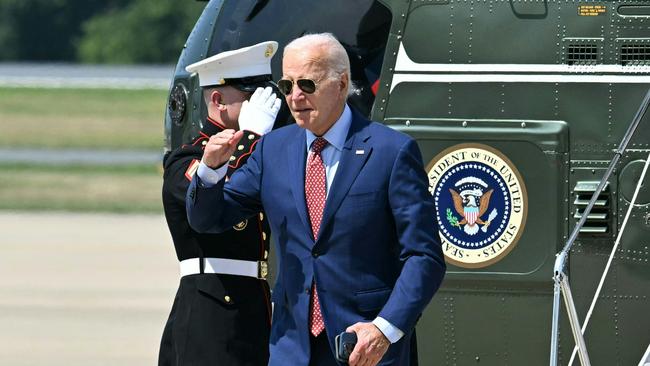US faces challenges as potential Iran attack on Israel nears
Biden administration mounts last-ditch appeal to Tehran, while also pushing to keep ceasefire talks alive.

The Biden administration is working to blunt a potential Iranian attack on Israel, but it faces an array of fresh challenges as it seeks to replicate the success it had in April when a multinational coalition helped Israel intercept a barrage of Iranian missiles and drones.
US officials said they have started seeing Iran moving missile launchers and conducting military drills, which could indicate an attack in the coming days. Iran has signalled it plans to retaliate against Israel for the killing of a senior Hamas leader in Tehran.
Biden administration officials also are concerned that an Iranian assault might be accompanied by strikes from Hezbollah, the Lebanese militia and Tehran’s other proxies in an attempt to overwhelm Israeli defences.
The US is now confronted with defending Israel from yet another Iranian attack if deterrence fails, while also pursuing its efforts to bring back stability to the region.
The prospect of a conflagration could derail President Joe Biden’s already faltering push for a Gaza ceasefire, which has become central to his Middle East diplomacy and foreign-policy legacy.
Top US officials are urging Tehran not to escalate the conflict and are pushing to secure the support of Arab nations in the face of veiled Iranian threats to states that contribute to Israel’s defence.
On Monday, Secretary of State Antony Blinken called on Iran, Tehran’s proxies and Israel to de-escalate, in a last-ditch appeal to prevent a broader conflict.
“We are engaged in intense diplomacy pretty much around the clock with a very simple message: All parties must refrain from escalation,” he said. “It’s also critical that we break this cycle by reaching a ceasefire in Gaza.”
Just over two weeks ago, Mr Blinken had expressed hope that the ceasefire talks were “inside the 10-yard line and driving to the goal line” after months of stop-and-start negotiations.
The Biden administration’s goal to secure the ceasefire and with it the release of Hamas’s hostages, some of them Americans, was at the top of the agenda when Mr Biden and Mr Blinken met with Israeli Prime Minister Benjamin Netanyahu on July 25. US officials think the ceasefire, in turn, will help calm the region, set the stage for defusing tensions along Israel’s northern border and be a step toward the eventual establishment of diplomatic ties between Israel and Saudi Arabia.
But last week, Hamas leader Ismail Haniyeh was killed in a targeted attack in Tehran. Israel didn’t provide advance notice to the US that it was planning to kill Haniyeh, which once again has spurred American officials into a high-stakes diplomatic effort to avoid a wider war.
Mr Biden and Vice-President Kamala Harris met with senior aides on Monday for a briefing on the latest developments and what a potential Iranian attack could look like. Mr Blinken, Defence Secretary Lloyd Austin and national security adviser Jake Sullivan were among the top officials around the table.
The Biden administration has been careful not to publicly criticise Israel’s Tehran operation, but it has been pressing all sides to de-escalate.
“I think the Biden administration is frustrated by what it sees as Israeli unilateral operations that do not sufficiently take into account American interests,” said David Schenker, who served as the State Department’s top official for the Middle East during the Trump administration.
Mr Biden spoke on Monday with Jordan’s King Abdullah II about efforts to de-escalate the situation and push for a ceasefire, and Mr Blinken phoned his Qatari and Egyptian counterparts about the current crisis in an effort to calm tensions. Jordan, whose foreign minister made a rare visit to Tehran on Sunday, and Saudi Arabia separately informed Iran that it couldn’t violate their airspace during an attack.
Western officials and analysts still assess that Iran, Hezbollah and Israel do not want an all-out war, although they acknowledge any military operation carries the risk of miscalculation.
The administration is trying to deter and if necessary prepare for an escalation nonetheless, sending a squadron of F-22 jet fighters and an aircraft carrier strike group to the region. General Erik Kurilla, the head of US Central Command, is now in Israel, just as he was in April during the last confrontation. The US has also stood up a joint team with the Israelis in Tel Aviv to co-ordinate missile defence, as it did in April.
“We’re preparing to defend Israel in an April-like manner,” a US official said.
The Wall Street Journal



To join the conversation, please log in. Don't have an account? Register
Join the conversation, you are commenting as Logout